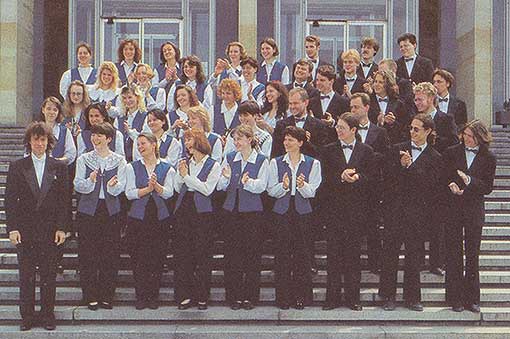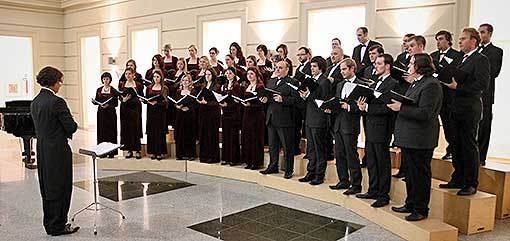The Brno-based Vox Iuvenalis choir will celebrate its 20th anniversary this year. Formerly a high school choir, it has become one of the best amateur choirs, winning several international competitions. Most importantly, its current members thorougly enjoy singing just like their predecessors did twenty years ago. Today it is managed under the auspices of the Brno University of Technology. Jan Ocetek has been with the choir since it was founded. We sat down with him to talk about the choir and its unusual projects.
Initially the members of Vox Iuvenalis were members of the choir at the high school on Vídeňská (street) in Brno who wanted to be in a choir after graduation. Were you one of them or did you join?
I really was one of the founding members. We were a big class of 1991 that inlcuded maybe fifteen or twenty members of a choir named Mladí madrigalisté led by professor Miluše Kleinová. And we wanted to keep singing after graduation. I was a member of the Brno-based men’s choir named Foerster at the same time, so my fellow members treated me as a semi-profesional. We formed a sort of “varsity team” and rehearsed at the school. But eventually, in 1993, we founded an independent choir and named it Vox Iuvenalis.
How did you become the leader of the ensemble? How did you convince your colleagues that you were the right man for the job?
In addition to Foerster, I was the leader of a church chorus in the church in Řečkovice and I had some experience with conducting. Plus I was a student of the Faculty of Education, majoring in music education and math. So they chose me based on my academic background.
Are there any founding members still with the choir, apart from you?
I think three or four of them have been witht he choir for twenty years, maybe with a short hiatus here and there.
 This choir seems to always have been a good team. You can see the camaraderie…
This choir seems to always have been a good team. You can see the camaraderie…
That, I think, is the most important thing. I steer them in a certain direction and music is the link. But they have to feel good about working together and they need to want to undertake activities unrelated to the choir. My respect for this attitude is growing – these people meet at rehearsals but they also enjoy spending time together elsewhere. And you can tell, based on their musical performance.
What do you have to do to make sure a rehearsal does not turn into a party?
They are docile because they have the opportunities to goof around outside the rehearsals. Whenevver someone is celebrating their birthday, they bring wine and some snacks for everybody, so it is a permanent party of sorts. But whenever it does get out of hand, I can raise my voice or ask them to leave …
…leave the rehearsal, I asssume...
Indeed. But only for a while, not permanently. They are there not just because of their love for music but also because of the group of friends and shared values.
You are a graduate of the Faculty of Education, the Faculty of Arts and the Janáček Academy of Music and Performing Arts (JAMU). Why didn’t you apply to JAMU in the first place?
Ironically, it was Vox Iuvenalis that sort of made me apply to JAMU. Of course I loved music even before I applied. I was in a chorus and I played the piano and the guitar, I attended a school for organists. As a high school graduate I still was not quite sure what I wanted to do. The Faculty of Education was a safety net and I added to it the Faculty of Arts, Department of Musicology, during my freshman year – I wanted to immerse myself in music more than a teacher would. And then all of a sudden the choir picked up and suddenly I wasn’t as much ahead as I used to be – my management methods were intuitive and amateurish. I wanted to keep up with them so I went to an admission exam to JAMU and I got in. And now I am where I am.
How did you come up with your repertoire? It is a relatively tough one. Have you always played 20th century authors or has it been a gradual process?
I was once a member of the Czech Philharmonic Choir Brno where I learned most of the typical choir repertoire. Considering the background of our amateur members I could not just apply the same approach in my ensemble. So I preferred choosing less famous pieces, instead of something all high school and college ensembles are used to singing. My intention has always been to select pieces that the members will enjoy and learn from. I knew that setting the bar higher may discourage some members and motivate others. I have always preferred less conventional repertoires and I think I still do, even though some of the members are old fashioned. I want to believe that we are where we are thanks to this preference of tougher repertoires. And the members are getting better whether they want to or not.
You create programmes which include modern-day and recent authors hailing from Brno, you even performed Schnittke’s Requiem a few times. Tough pieces, I must say. Do your choir members miss the nice songs?
Sometimes I try to make it up to them, but a team is a team. Some people will sing just anything, some people are picky but they will accept an explanation. And some will always complain but they show up and sing anyway. When it comes to the complex things I always try to explain why we are doing this or that. And so it happens after a tough song that emotions are running high and some people are about to leave so I pick something easier. And suddenly the same people are asking why they should sing something so trivial. On one hand they want to sing something easy and nice but they do not feel the much needed gratification about a job well done…
…like when a marathon runner goes for a walk.
Exactly. They have learned to do and cope with complex things and now simpler things seem too primitive to them. I have brought it on myself as well because the portfolio of these songs is not endless. I have to consider the members’ ability to even sing it without collapsing after an evening programme of a capella performance of modern-day music, or to be able to hire an ensemble which would perform vocal-instrumental projects with us. So limitations exist on several levels.
Has there been any deeper idea behind your concerts from the beginning? Or where does your thinking come from and who is behind it?
Viktor Pantůček has great ideas in this area. Sometimes he is too big a visionary, but the follow-up discussion shapes things up. I think it is very beneficial to bring interesting, quality music to unusual venues. This combination of a good programme with a suitable venue is rewarding for everyone. We had a concert in the House of Art which offers excellent acoustics and environment or more recently in the Brno crematorium or in the courtyard of the Palace of the Lords of Kunštát or in a cave. We still have many challenges on our minds because there many interesting potential concert venues that people would otherwise never have visited. The result is a multi-level experience.
Even though you may try to do your best, you are still an amateur choir, with certain limitations. Does your concept outweigh the fact that you cannot measure yourselves with professional ensembles?
Definitely, because only a few of our members have ever studied music. Most of them are amateurs who wanted to join because they love to sing and they have certain qualities and the will to give it a shot. So there are certain undeniable boundaries. However if we can offer our audience things they will not hear anywhere else, we are motivated to do it even though it is not 110% quality of a professional choir. Modern music is much more suitable than, let’s say, Baroque.
You are the Second Choir Master of the Czech Philharmonic Choir Brno (CPCB). What is the biggest difference in terms of the style of work? Do any members transfer between these two ensembles?
The distinction is evident. The members of CPCB are professionals and employees. CPCB’s repertoire is based on the demand and my role is to prepare it for every show. On the other hand, Vox has the freedom to choose the repertoire and to schedule enjoyable concerts. Otherwise they wouldn’t be doing it.
So you don’t want to turn Vox into a farm team for CPCB...
Absolutely not. Many members are students of colleges or universities in Brno and the choir is a secondary, albeit pleasant, free-time activity for them.
Looking back at the very beginning – would you have ever guessed that you would stay together for so long?
I never would have guessed that we would ever disband. If a choir works well it goes from one concert to another. I never really had any visions for the future and I have always been doing my best to keep it going. I am shocked and amazed at the same time how long this has been going on and how many members the choir has had throughout its existence.
What do you think was the biggest success of Vox Iuvenalis and what does success mean to you generally?
Our ability to stay together for twenty years without a hiatus is the biggest success. The choir has a decent reputation; it has achieved a certain level of interpretation. And hopefully it has its loyal audience who are not relatives of the members. We are an independent and sustainable musical project with a twenty-year tradition. Victories in competitions and interesting concerts are the proverbial cherry on top which tends to be soon forgotten. The continuity is the best thing about it. I have to mention that my wife Hana has been helping me from the very beginning. We were classmates at the Department of Musicology and Vox was “our first child”. So I shouldn’t be taking all the credit for the success, because she deserves hers and I can’t thank her enough.
Competitions and festivals – achievements
2012 International competition of choir performance of sacred music Laudate dominum, Vilnius, Lithuania, first prize
2008 International choir competition Canti veris Praga 2008, Prague, second prize in the mixed choir category
2007 International Festival of Youth Choirs and Orchestras YOUNG2007PRAGUE, first prize, special prize for extraordinary performance of a mandatory piece
2006 International Festival of Academic Choirs IFAS, Pardubice, first prize, special prize for the dramaturgy of the competition programme
2005 17th International Choir Festival TZD, Trnava, Slovakia, first prize, special prize for the dramaturgy
2004 7th International Youth choir Festival, Veldhoven, the Netherlands, first prize
2003 Prague Choir Days, first prize, special prize for the choir master
2002 1st International Choir Festival in Randers, Denmark, second prize
2000 Prague Choir Days, second prize, special prize for the performance of mandatory pieces, special prize for the choir master
The choir has cooperated in the following opera and musical shows:
Sommer Oper Bamberg: The Marriage of Figaro (W. A. Mozart) 2011, La bohème (G. Puccini) 2009, Pagliacci (R. Leoncavallo), Il tabarro (G. Puccini) 2007
Janáček Brno 2010: Šárka (L. Janáček) – world premiere of the original version of the opera for the piano
Chamber opera of the Faculty of Music of the Janáček Academy of Music and Performing Arts: The Marriage of Figaro (W. A. Mozart) 2008
Ruddigore (A. S. Sullivan) 2007
Hradby (M. Kux) 2007

































No comment added yet..